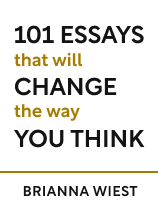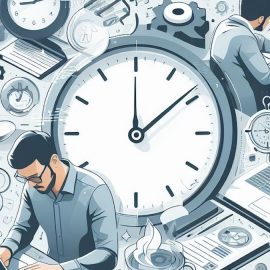

This article is an excerpt from the Shortform book guide to "101 Essays That Will Change the Way You Think" by Brianna Wiest. Shortform has the world's best summaries and analyses of books you should be reading.
Like this article? Sign up for a free trial here .
Do you sometimes think something and wonder: “How on earth could I have thought that?” Where do thoughts come from? Is it possible to control your thoughts?
As the popular adage goes, you shouldn’t believe everything you think. While you can’t totally control the stream of your consciousness, you can control how to react to the thoughts that come to your mind—whether to brush them off or to give them weight by entertaining them further.
With this in mind, here’s how to control your thoughts.
Take Responsibility for Your Thoughts and Emotions
In her book 101 Essays That Will Change the Way You Think, Brianna Wiest explains how to control your thoughts. The first step, she says, is to acknowledge that you’re the only one responsible for them. Recognizing this fact encourages you to:
- Understand how your thoughts influence the way you interpret and feel about your experiences.
- Realize when you’re giving control of your thoughts and feelings to things outside of you—for example, when you credit or blame other people or situations for your emotions.
- Explore ways to think differently about the people and things that make you feel bad—because you know that’s the only way to improve the way you feel about them.
- Make conscious decisions that align with your needs and encourage you to feel good about yourself. For example, refusing to attend social events that you have no interest in gives you more time to pursue things that you’re genuinely interested in.
Change Your Self-Image Before Attempting to Change Your Thoughts
Wiest seems to imply that you can change your thoughts and emotions simply by deciding to take responsibility for them. However, this isn’t as easy as it sounds: While you may attempt to change your thoughts when you’re aware of them, the majority of your thoughts take place beneath your awareness—in your subconscious mind.
In Psycho-Cybernetics, Maxwell Maltz explains that your subconscious mind learns from your habitual thoughts and feelings to create your self-image. It then influences you to think and behave in ways that reflect this self-image and actively discourages you from thinking or behaving in ways that are inconsistent with it. Maltz goes so far as to say that your subconscious mind sabotages your conscious attempts to change your habitual thoughts.
For example, if you habitually think that people are out to get you, you’ve trained your subconscious mind to include perpetual distrust as a part of your self-image. As a result, your subconscious mind influences you to automatically think and act in ways that keep you focused on all the ways people could harm you. It might influence you to think paranoid thoughts or encourage you to act defensively. Additionally, it may sabotage any attempt you make to trust others—for example, influencing you to interpret innocent remarks as insults.
Unlike Wiest, Maltz argues that you can’t rely on your thoughts to change your feelings unless you consciously change your self-image and retrain your subconscious mind. He suggests that you can achieve this by regularly visualizing yourself behaving in ways that align with what you want and who you want to be.

———End of Preview———
Like what you just read? Read the rest of the world's best book summary and analysis of Brianna Wiest's "101 Essays That Will Change the Way You Think" at Shortform .
Here's what you'll find in our full 101 Essays That Will Change the Way You Think summary :
- Why the only way to make yourself feel better is to change the way you think
- How social conditioning influences the way you unconsciously think
- How to manage your thoughts and feelings about yourself and your experiences






